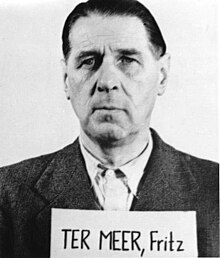Fritz ter Meer
| Fritz ter Meer | |
|---|---|

Fritz ter Meer
|
|
| Born |
4 July 1884 Uerdingen, Rhine Province, Prussia, Germany |
| Died | 27 October 1967 (aged 83) Leverkusen, Germany |
| Nationality | German |
| Fields | Chemistry |
| Institutions | IG Farben, Bayer |
Fritz ter Meer (4 July 1884 – 27 October 1967) was a German chemist.
From 1925 to 1945 Fritz ter Meer was on the board of IG Farben AG. He was involved in the planning of Monowitz concentration camp, a satellite camp of KZ Auschwitz. Fritz ter Meer was sentenced to seven years in prison in the Nuremberg Trials in 1948. After he was released in 1951 he became supervisory board chairman (Aufsichtsratsvorsitzender) of Bayer AG.
Fritz ter Meer was the son of Edmund ter Meer (1852–1931), who founded the chemical company Teerfarbenfabrik Dr. E. ter Meer & Cie in Uerdingen, which in 1925 became part of IG Farben. His family tree can be traced back to the 15th Century.
After completing his schooling from 1903 to 1908 ter Meer studied in France and Germany also briefly chemistry and law. He received his doctorate in 1909 in Berlin with regard to the thesis of the ether Isonitrosoketonen. Subsequently, in-depth studies followed the dye chemistry in Krefeld and abroad in France and England.
Thereafter, he worked in the family-owned company Dr. E. ter Meer & Co., where he held senior positions and in 1919 became a member of the Board. After the merger he worked for IG Farben until 1945.
From 1925 to 1945 Fritz ter Meer was on the board of IG Farben AG. He was also from 1932 a member of the Working Committee and the Technical Committee, Head of Division II in the War Ministry and the defense industry. In May 1937, he joined the NSDAP.
On 7 September 1939 he and Henry agreed with the Army Ordnance Hörlein the production of the gas Tabun, an extremely toxic nerve agent. More than 100 prisoners of war were used during construction of the designated poison gas factory in Dyhernfurth.
He was involved in the planning of Monowitz concentration camp, a satellite camp of KZ Auschwitz and responsible for helping build the IG Farben Buna Werke factory at Auschwitz, which conducted human experiments and held some 25,000 forced laborers under deplorable conditions. [1]
...
Wikipedia
